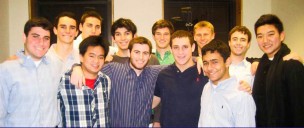
The University chapter of the Chi Psi fraternity was recently rechartered by the national organization, fully re-establishing itself as a member of the national fraternity. Chi Psi was first brought to campus in 1843; after a series of disciplinary issues, it was last disbanded in 2001. It returned to campus under a provisional status last year.
Alex Sakhno ’15, a member of the fraternity, noted that alumni have been very involved in the fraternity’s resurgence.
“The alumni are extremely excited, especially the guys from the ’90s, because they feel like they were the last part of the group that split with the University and caused the rift,” Sakhno said.
Ozair Sarwar ’15, another Chi Psi member, said that rebuilding the group from the ground up has made the process even more special to its members.
“Because we are reestablishing this after so long, we are sort of creating it on a foundation that we have formed because we are figuring out our way,” Sarwar said. “We are getting help, but what we are creating is different than what it was before, and it’s something that is personal for everybody.”
In February of 2012, the group achieved colony status, bringing it one step closer to full chapter privileges. That summer, several Chi Psi brothers attended the national convention, held at Wake Forest University, to present a petition for chapter status. They presented their petition to a group consisting of representatives from every Chi Psi chapter in the country, earning unanimous approval for their charter. The fraternity was on provisional status last year and was rechartered this fall, finally rendering it an official chapter.
As they moved through the process of getting rechartered with the national Chi Psi organization, the members have also tried to repair relations with the University. Conscious of its sometimes-rocky past with the campus and administration, Chi Psi is trying to shape its new reputation by getting involved with Habitat for Humanity and Relay for Life. They are also helping to sponsor events with other groups on campus, such as the Fast-a-Thon with the Muslim Student Association.
“We are just trying to represent ourselves in a good way and give back to the community,” said Chi Psi President Sam Elias ’15. “We want to have a good time and create a fun atmosphere.”
Getting recognition from fellow Greek life members is also important to the fraternity. While on provisional status last year, Chi Psi was voted into the Inter-Greek Council (IGC), a group of all Greek organizations on campus. IGC and Rho Epsilon Pi Co-Founder Lucy Finn ’14 noted that the fraternity has been impressive thus far.
“[During the time they were provisional], the Chi Psi members had good attendance [at IGC meetings],” Finn said. “It’s very obvious that the people involved are very dedicated to making this happen and doing so in the right way.”
Chi Psi is one of several relatively recent additions to campus Greek organizations. Vice President of Student Affairs Rick Culliton clarified the University’s stance on expanding Greek life.
“Any group that wants to start a Greek organization may do so through the WSA, but we have no plans to expand our residential Greek options beyond those that currently exist,” Culliton wrote in an email to The Argus. “We have many Greek organizations at Wesleyan that do not have chapter houses.”
Culliton added that the University has no official means of recognizing new Greek organizations.
“Many national organizations want the endorsement of the college—which also means oversight of the group by a Greek affairs office/staff (including verifying grades of student members, oversight of the fraternity initiation process, etc.),” Culliton wrote. “We do not have staff or a process to do this, and have made that clear to each national fraternity, including Chi Psi, when they have approached us.”
President Roth reiterated the University’s stance that no further Greek housing options will be considered.
“If students want to join a club, it’s up to them—we’re not against students joining clubs…,” Roth said. “But it has nothing to do with housing, which is not a possibility. If people are joining clubs, that’s good, even clubs with Greek letters that involve rituals of induction.”
Finn experienced difficulty with this policy last year, when Rho Epsilon Pi and Alpha Epislon Pi were not permitted to apply for the then-open program house at 230 Washington St.
“President Roth doesn’t like Greeks,” Finn said. “I doubt he wants them back on campus, just because he hasn’t been supportive of Greeks in the past. He thinks that’s a problem area because he associates us with cheating and sexual violence and high risk drinking.”
Roth recalled his experience with Chi Psi when he was enrolled as a student at Wesleyan.
“I used to live next to Chi Psi when they had a house, and I don’t look forward to any further contact,” he said.
Members of Chi Psi do not expect to be given a house, but they hope that the University is willing to accept their existence on campus.
“We are in a very neutral state right now,” Sarwar said. “We don’t have any direct discussions with President Roth, nor do we have any conflict or negativity toward him. He’s entitled to his own opinions, and as long as we can co-exist, we will get along fine.”


Leave a Reply